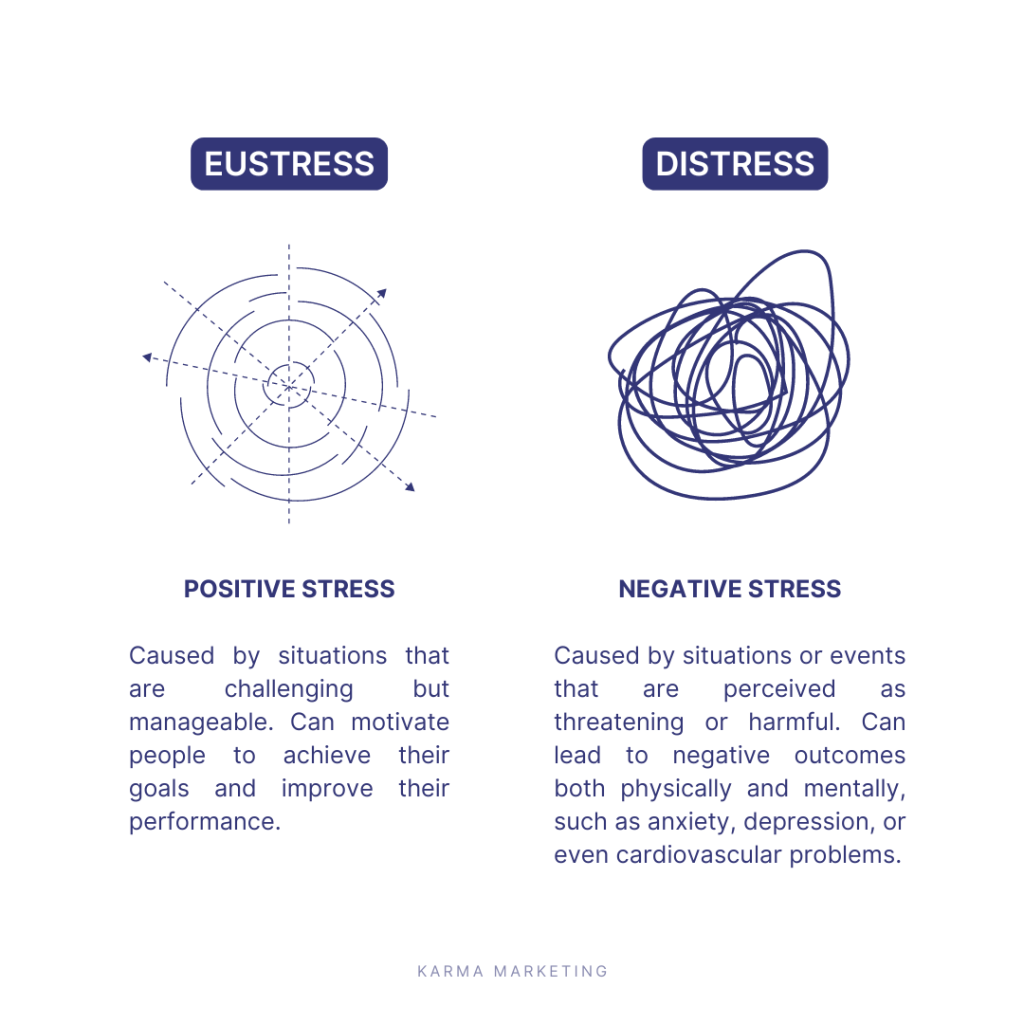Stress has woven itself into our daily lives, often manifesting as weight on our shoulders. Whether it’s a looming deadline, a challenging relationship, or the constant buzz of notifications, many of us feel the pressure mounting in ways that can be hard to articulate.
Just because stress is an inevitable part of life doesn’t mean we have to let it consume us. Yes, feelings demand to be felt, and stress demands to be acknowledged, but its purpose isn’t to trap us in idleness. It’s a signal, a call to action, reminding us to pause, reassess, and make necessary changes.
It’s easy to dismiss these feelings as just part of life, but acknowledging them is the first step toward finding balance.
Stress isn’t meant to define our existence; it’s there to guide us towards growth and resilience. By listening to it, but not becoming immersed in it, we can use stress as a tool for positive action and transformation.
Going With The Flow
In our previous article, Rethinking Stress: The Dynamics of Distress and Eustress, we talked about how stress is a normal physical and psychological response we develop in response to some circumstances, preparing us to ‘fight or flight’.

Stress doesn’t have to be viewed solely as negative (distress). Instead, we can consciously reframe it as positive stress (eustress), which can serve as a powerful motivator.
Building on the idea of reframing stress as an opportunity for growth, letting go of control complements this mindset by helping us focus on what we can change and accepting what we can’t. When we let go of set rules and regulations, and rather recognize what stress tells us, there is room for development and adaptability.
There are times when we have no say over what comes our way, and even less control over how we first respond. What we can control is how we engage with stress: instead of resisting it, we can learn to “dance” with it.
This means accepting stress as a natural part of life, acknowledging its presence without letting it overwhelm us. It’s about recognizing when stress shows up, understanding what it’s trying to tell us, and moving with it rather than against it.
Just as dance partners synchronize with each other’s moves, we can respond to stress by adapting, adjusting, and finding our own rhythm when faced with stress and uncertainty.
The idea of “going with the flow” comes into play here. Not the kind of flow without aim of direction, but rather the state of trust of perseverance regardless of the struggle. This encourages us to release our grip on control and accept that some things are beyond our influence. Acceptance is a crucial step in managing stress and can lead to a more peaceful state of mind.
Letting go doesn’t mean ignoring our challenges; it means acknowledging them and finding a way to move forward.
Surrender vs. Flexibility: Two Paths to Acceptance
While surrender and flexibility might seem similar, they represent different approaches to coping with life’s unpredictability.
Surrender is about acceptance. It begins with recognizing feelings of powerlessness when faced with situations we cannot change. This process often leads us from a place of struggle to one of peace, as we learn to find gratitude in our circumstances and appreciate the lessons they offer. However, surrender can also carry connotations of defeat, leading some to feel trapped or taken controlled over.
On the other hand, flexibility embodies a proactive mindset. It emphasizes adaptability and resilience, allowing us to navigate challenges while maintaining a sense of control. Being flexible means having the resources to adjust our plans, shift our goals, and redefine our paths toward happiness, regardless of the obstacles we encounter.
In other words, being flexible is the natural progression that follows surrendering to life. It’s the act of taking acceptance one step further, transforming it into action. Surrender may teach us to let go, but flexibility teaches us to realign our path and reshape our goals when the unexpected happens.
Flexibility offers a sense of freedom because it allows us to step away from the weight of rigid expectations. It’s the understanding that life, by its very nature, is unpredictable and ever-changing, and that true freedom lies in our ability to move with it rather than against it. When we’re flexible, we’re not enslaved by the need for things to go exactly as planned, or for people to behave in ways we expect. Instead, we’re open to the fluidity of existence, accepting that paths may diverge, outcomes may differ, and that’s okay.
It’s a freedom that comes from releasing the need to control everything around us and finding peace in navigating the unknown. Flexibility means we’re not paralyzed by disappointment when things don’t work out the way we imagined; instead, we find new ways to grow, new goals to pursue, new meanings in what is. It’s the ability to maneuver through life’s uncertainties, to let go of old identities, reshape desires, and remain present with the moment, whatever it brings.
In a way, being flexible is the ultimate act of faith—not in a specific outcome, but in ourselves. It’s trusting that no matter what happens, we’ll find a way to endure, to find joy, to make sense of the chaos. And that’s where the real freedom lies: in knowing that we’re resilient enough to adapt, and brave enough to embrace the journey, no matter where it leads.
Afterthought
Stress frequently arises when we become overwhelmed by responsibilities, expectations, and unexpected challenges. In these moments, our minds can feel clouded, making it easy to lose sight of our original motivations. We often find ourselves fixated on just getting things done so we can finally catch a breath. Yet, even then, the pressure to meet external expectations can weigh us down.
Most of us tend to suffer through imagination more than reality. Many problems that seem huge at first glance often shrink when we take a step back and look at them constructively.
Stress demands to be acknowledged, because they guide us to areas that need change. This doesn’t mean overhauling your life in a day. Start small, like tidying your room or organizing your workspace. Physical decluttering can lead to mental clarity. Then, look inward: what’s weighing you down emotionally or mentally? Maybe it’s a self-imposed rule or expectation you need to release.
Letting go and being flexible can really make a difference when it comes to stress. It’s all about realizing that we don’t have to have everything figured out all the time.
We just have to figure it out one by one.
Letting go of control doesn’t mean giving up; it’s about directing your energy toward what you can actually change and accepting what’s beyond you with a positive attitude.
Recognize that while some things are beyond control, others aren’t. It’s up to you to notice these opportunities for change and take action.
In doing so, you’re not just managing stress—you’re turning it into a catalyst for the art of living.
“The greatest weapon against stress is our ability to choose one thought over another.” – William James.
Karma Wisdom | Curated research written by Anya Junor
